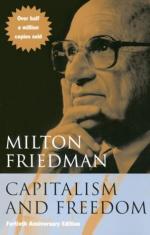
|
Introduction
1. Who does Friedman state rejects the view that the government is the patron or master of the citizenry?
(a) The poor man.
(b) The educated man.
(c) The free man.
(d) The rich man.
2. Friedman defines a country as a collection of ______.
(a) Ideals.
(b) Citizens.
(c) Leaders.
(d) Individuals.
3. Friedman advocates that government should not be a master, but a/an ______.
(a) Philosophy.
(b) Mechanism.
(c) Slave.
(d) Instrument.
4. In Friedman's opinion, what should individuals be allowed to do?
(a) Choose their own religion.
(b) Print their own money.
(c) Elect their own leaders.
(d) Pursue their own ends.
5. One question Friedman asks is how we can stop government from destroying ______.
(a) Freedom.
(b) Citizens.
(c) Entertainment.
(d) Taxes.
6. According to Friedman, what is liberty's greatest enemy?
(a) The Federal government.
(b) Elected leaders.
(c) The educational system.
(d) Concentration of power.
7. Friedman states that government should be ______.
(a) Held accountable.
(b) Destroyed.
(c) Limited.
(d) Expanded.
8. Besides enforcing contracts, what one other thing does Friedman say government should do?
(a) Protect against external threats.
(b) Regulate commerce.
(c) Provide for public transportation.
(d) Secure a country's borders.
(read all 180 Multiple Choice Questions and Answers)
|
This section contains 4,031 words (approx. 14 pages at 300 words per page) |

|




